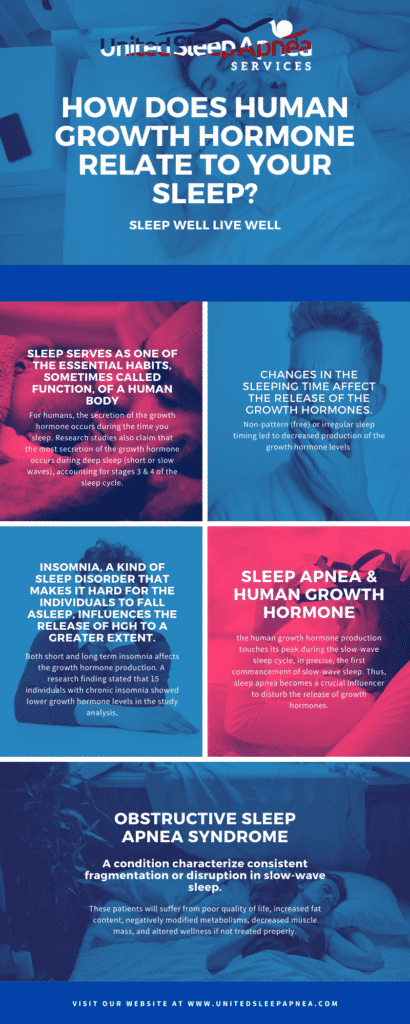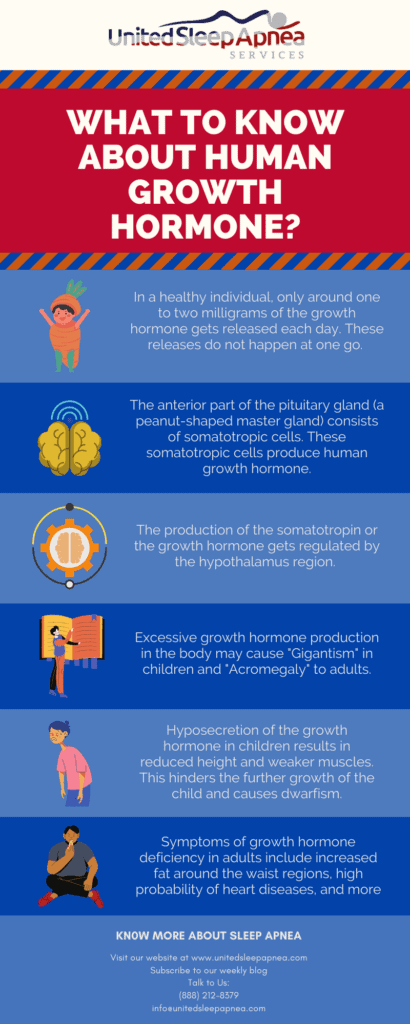Human Growth Hormone
From childhood to becoming an adult, every human requires growth. The human growth hormone (HGH) accounts for this human growth and development across a preset stage and respective functions at each stage.
The growth hormone, produced as a lengthy single-chain polypeptide, helps stimulate the growth, development, and regeneration of individuals. The hormone also owns other responsibilities, including the regulation of several physiological processes.
In a healthy individual, only around one to two milligrams of the growth hormone gets released each day. These releases do not happen at one go. Instead, it is secreted in short pulses between every three to four hours and follows a circadian rhythm. Also, the length of these pulses cannot be equal at all times. It varies in amplitude, depending upon the stimuli.
These varied pulses help in the growth of the children during their childhood. Over a period, the production increases and attains its peak when the child attains puberty.
Post completion of the individual’s growth as an adult, the hormone helps in other functions (metabolism) rather than performing the function of further growth.
We will discuss later how your growth hormone is affected in the presence of sleep apnea and other types of sleep disorders.
How is HGH Produced?
The anterior part of the pituitary gland (a peanut-shaped master gland) consists of somatotropic cells.
These somatotropic cells produce human growth hormone. After production, these hormones are released into the bloodstream whenever required. The bloodstream carries the hormone across different organs and parts of the body.
The somatotrophic cells that produce these hormones can also store them within themselves and release them only when receiving the signals from other respective glands or organs. Hence, the growth hormone gets another name called “Somatotropin.”
How is growth hormone regulated in the body?
The production of the somatotropin or the growth hormone gets regulated by the hypothalamus region.
The hypothalamus releases an inducing hormone called growth hormone-releasing hormone or GHRH, which stimulates and signals the somatotropic cells to produce the growth hormone.
The production of the hormone is inhibited in two ways:
- Via somatostatin cells: Various nervous, digestive, and hypothalamic cells produce these somatostatins to inhibit the human growth hormone secretion. As it performs the inhibition, it is called “growth hormone-inhibiting hormone or GHIH.”
- Insulin-like Growth Factor I (IGF-I): IGF-I inhibits the growth hormone secretion using a feedback mechanism. This hinders the release of growth hormone-releasing hormone (GHRH) at the hypothalamic region and the growth hormone at the pituitary levels.
Other factors that regulate the secretion of growth hormone include age, gender, lifestyle, sleep, food, exercise, and body composition.
During sleep, exercise, and low sugar levels, you can observe an increase in the growth hormone production. At the time of pregnancies, the release of these hormones gets reduced.
How does your body use human growth hormone?
The human growth hormone is secreted into the bloodstream and reaches different parts of your body. Based on the cell in which the growth hormone’s receptors exist, your body undergoes specific physiological and metabolic changes in an autonomous mode.
Physiological Effects
- Direct: This happens when the growth hormone binds itself to target cell receptors; your body undergoes target-based changes. For example, if the growth hormone binds to fat cells, it breaks the fat and prevents fat accumulation in the body.
- Indirect: Indirect changes occur due to other factors like insulin growth factor instead of the growth hormone itself.
Metabolic Effects
- Proteins: The growth hormone helps in increased protein synthesis and decreased protein oxidation.
- Carbohydrates: The growth hormone regulates the blood glucose levels and suppresses insulin’s ability to take up glucose.
- Lipids: The growth hormone helps in the breaking of triglycerides and adipocytes oxidation.
What are the benefits of Human Growth Hormone?
Now that you have learned the basis on how growth hormone is created within the body as well as how it is regulated to move to certain parts of the body, we want to discuss the over benefits and why it is important that your daily sleep habits do not hinder your body from producing this beautiful and glorious hormone. You benefit from growth hormone in the following ways:
- Growth hormone acts in both synergistic and antagonistic means.
-
- Synergistic: When your body gets enough nutrient intake, insulin level increases in your liver. This stimulates the production of IGF-I. In this case, the growth hormone helps in protein anabolism. This is the process in which the amino acids you ingest are formed into protein.
- Antagonistic: When your body serves in demand for nutrients (during sleep or exercise), the growth hormone performs its lipolysis function (breaking of triglycerides for energy).
-
- Helps in maintaining the body structure
- Helps in inflammation recovery of damaged cells and tissues
- Used as a medication for growth-related disorders (Say, dwarfism in children)
- Acts as a primary hormone in the growth of children
- Regulates the functions of the heart and various body fluids
- Helps in increasing muscle strength and bone density
- Helps in balancing the energy levels
- Efficiently manages the body metabolisms (Protein, Carbohydrates, and Lipids)
- Aids in skin thickening and toning
- Increases the sexual drive among both men and women libidos
- Keeps the individual younger than their present age
- Stimulates elemental cell growth and division process
- Works at the time of stress and mobilizes energy
Imbalances in Human Growth Hormone
Excessive Growth Hormone
Excessive production of the growth hormone accounts for three main reasons:
- Formation of somatotroph tumor cells: A benign tumor or adenoma in the pituitary gland causes increased growth hormone production.
- Formation of tumors in lung cells or islets of Langerhans (in pancreatic cells) causes increased production of growth hormone-releasing hormone (GHRH), which in turn, increases the production of the growth hormone.
- Production of growth hormone by tumor cells that do not produce the hormone on a usual note. This kind of ectopic hormone production occurs in exceptional cases.
Excessive growth hormones could be diagnosed by analyzing the patients with the intake of a sugary drink.
In normal cases, after sugar intake, the growth hormone production must be reduced. Suppose the patient shows an increase in the hormone levels, this confirms the overproduction of hormone levels.
In general, hypersecretion of the human growth hormone causes gigantism in children and acromegaly in adults.
In Children – Gigantism:
Children experiencing increased growth hormone levels grow in abnormal heights. Once their greatest height is attained, the hormone starts acting upon bones.
The individual’s bones start growing larger than ever and result in larger arms (hands and legs), extended jaws, thick and dense fingers, and hulking heads. This condition in children makes them look gigantic individuals, and hence the name “Gigantism.”
Apart from abnormal heights, these individuals also experience frequent headaches, insomnia, weakness or tiredness, nerve and vision problems, deafness, sweating, delayed puberty in both boys & girls, and joint pain. On rare occasions, girls may experience irregular menstrual cycles.
In Adults – Acromegaly:
Adults experiencing excessive growth hormone may lead to overgrowth of facial and other features/organs. Consistent excessive growth hormone production leads to a condition called Acromegaly.
In this state, the individuals have enlarged organs, swollen hands and feet, and modified facial features (nose, chin, tongue, mouth). This overgrowth accounts for the increased growth of muscle, cartilage, and skin cells.
Symptoms of acromegaly include sleep apnea, insomnia, other sleep related disorders, severe headaches, fatigue, spaced teeth, swollen joints, increased sweating, weakened muscles, and body odor.
Acromegaly individuals have a high probability of developing other health problems such as high blood pressure, arthritis, diabetes mellitus, large intestine tumors, and cardiovascular diseases. (hypertension), cardiovascular disease, and arthritis.
Growth Hormone Deficiency
When your body does not produce enough growth hormone to perform its usual functions, it results in the hormonal deficiency.
In Children:
Hyposecretion of the growth hormone in children results in reduced height and weaker muscles. This hinders the further growth of the child and causes dwarfism.
In children, the deficiency may have caused due to the following reasons:
- Damaged or incomplete development of the hypothalamus or the pituitary gland during the fetal growth or after birth.
- Sometimes, the growth hormones itself may have improper protein structures, preventing the growth promotion activity of the hormones.
- There are even special cases where the growth hormone-releasing hormone (GHRH) deficiency may have caused the growth hormone deficiency.
- In some cases, a mutation in the pituitary gland cells’ genes may have caused the reduced secretion of the hormones.
In Adults:
Symptoms of growth hormone deficiency in adults include increased fat around the waist regions, high probability of heart diseases, fatigue, reduced bone and muscle mass, depression, thinning and dry skin, frequent mood switches, decreased bone density, and sleeping disorders.
Hyposecretion of growth hormone in adults may have caused due to:
- Genetic inheritance of the pituitary gland to secrete decreased growth hormone levels
- Injured somatotrophic cells in the pituitary gland
- Brain injury
- Cells damaged during the treatment of other health concerns (cancer, brain issues)
In adults, hyposecretion of growth hormone affects not only their growth but also their wellness. Energy levels often drop due to the deficiency, and individuals get weakened. Empirical evidence shows that around half of the adults who experienced growth hormone deficiency feel tired and experience impaired wellbeing.
 How does Human Growth Hormone relate to your Sleep?
How does Human Growth Hormone relate to your Sleep?
Sleep serves as one of the essential habits, sometimes called function, of a human body.
For humans, the secretion of the growth hormone occurs during the time you sleep. Research studies also claim that the most secretion of the growth hormone occurs during deep sleep (short or slow waves), accounting for stages 3 & 4 of the sleep cycle.
In specific, the peak secretion occurs during the first slow-wave sleep and makes up more than half of a day’s secretion levels. Further secretion occurs during the commencement of 2nd or 3rd short-wave sleep cycles.
If this stage of sleep is interrupted by wide-awake conditions or disrupted nocturnal sleep disorders, your body faces difficulties producing required growth hormones.
Overtime this can be detrimental so that it is essential that you are getting quality sleep.
Though some individuals may think they are sleeping their full amount of sleep needed, little do they know that some sleep disorders affect the overall quality of sleep
Some important research findings relating to the human growth hormone with sleep found:
- Changes in the sleeping time affect the release of the growth hormones
- Non-pattern (free) or irregular sleep timing led to decreased production of the growth hormone levels
- Sleep deprivation from sleep apnea or sleep habits changes the usual pattern of growth hormone release into the bloodstream
Are you wondering if you’re already sleep-deprived? Take up the Epworth Sleep Scale test now!
Insomnia & Human Growth Hormone
Insomnia, a kind of sleep disorder that makes it hard for the individuals to fall asleep, influences the release of human growth hormone to a greater extent.
Both short and long term insomnia affects the growth hormone production. A couple of years ago, a research finding stated that 15 individuals with chronic insomnia showed lower growth hormone levels in the study analysis.
Sleep apnea & Human Growth Hormone
As you know, the human growth hormone production touches its peak during the slow-wave sleep cycle, in precise, the first commencement of slow-wave sleep. Thus, sleep apnea becomes a crucial influencer to disturb the release of growth hormones.
Obstructive sleep apnea syndrome (OSA) conditions characterize consistent fragmentation or disruption in slow-wave sleep.
In OSA patients, the somatotropic axis is damaged, and the Insulin-like growth factor I (IGF-l) secretion is reduced. This also decreases the ability of the somatotropic cells to produce growth hormones.
If this situation continues, these patients will suffer from poor quality of life, increased fat content, negatively modified metabolisms, decreased muscle mass, and altered wellness.
On a longer note, this leads to accelerated aging, premature atherosclerosis (refers to the buildup of fats, cholesterol and other substances in and on your artery walls), and advanced heart problems.
Symptoms of sleep apnea or sleep deprivation in children include irritability, nocturnal urination, and lack of focus. Besides these symptoms, adults might also show signs of depression and chronic pain.



